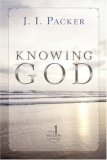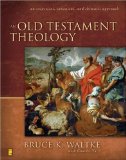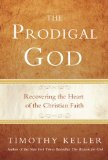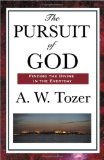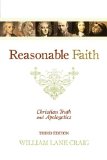Many, many thanks to Connie at Crossway Books for this review copy. Thanks and apologies to Connie and Danny that it’s taken me a year to get around to a review of this book, a delinquency for which I have no good excuse, save several weak ones that perhaps taken together…
I am as intimidated as I am happy at the chance to review William Lane Craig’s Reasonable Faith , which Craig himself supposes to be his “signature book” (p.11). I have already commented on the excellent introduction to this book here, and would commend it to anyone who would question prima facie the merit Christian apologetics.
, which Craig himself supposes to be his “signature book” (p.11). I have already commented on the excellent introduction to this book here, and would commend it to anyone who would question prima facie the merit Christian apologetics.
The purpose of the book, Craig states, is to focus primarily on the theoretical issues of Christian apologetics, as opposed to offering a manual of “how to’s” (p.23). Pragmatists (among whom I count myself) needn’t worry, however. While Craig does indeed focus on theory, he touches down often enough to help the reader apply what has been discussed. That said, make no mistake that this is not a light read. This is a book for study and careful reflection, not a cozy morning on the porch. Consider, for example, some titles taken from the table of figures (p.9): “Cyclic Ekpyrotic Scenario,” “Oscillating Model with entropy increase,” and “Bubbles of true vacuum in a sea of false vacuum.”
Craig is very thorough, and very technical, but the diligent reader needn’t worry; let not the titles above scare you away. Like many (most?) matters in study, the reward you will reap from careful reading of this book is well worth a few trips to the dictionary, or re-reads of a paragraph. To be fair, I should also mention that text isn’t all cyclic ekpyrotic scenarios, either, and Craig often explains the terms he uses in the lucid, frank prose that makes him one of my favorite apologists. At the very worst, while you not come away being able to describe why the cyclic ekpyrotic scenario fails to explain the universe, should you find yourself witnessing to an astrophysicist who has interest in such matters, boy do you have the book for him!
Craig’s book is broken down into five major sections, an arrangement inspired by some of the principal themes of post-Reformation Protestant theology: faith, man, God, creation and Christ (or de fide, de homine, de Deo, de creatione, and de Christo, as Craig titles them, much to the pleasure of my nerdliness). I shall break down this review roughly along these lines, so as to keep each post managable.
Each section begins with a historical background viz., how have other thinkers addressed this issue? These are immesely helpful, and well-written. They also do well to remind us, in the tradition of Isaac Newton, that we stand on the shoulders of thousands upon thousands of great minds. Craig’s development is chronological, and lays the groundwork for his own, present day “assessment,” which follows.
In De Fide, Craig makes an important distinction: There is a difference between knowing the Christian faith to be true and showing the Christian faith to be true. He goes on to explore both of these topics at length, fleshing out the details of each. For Craig, the heart of knowing Christianity to be true is the work of Holy Spirit testifying that it is true (e.g., pp. 43, 46). Craig’s support for this is a perfect blend of copious Scriptural support (e.g., 1 Jn. 3:24; 4:13) and well-reasoned arguments. This mixture is seasoned with rebuttals to common objections.
Consider, for example, Craig’s response to the “objection” that some neuro-scientists can artifically stimulate certain areas of the brain to induce “religious experiences.” A believer’s experience of the witness of the Holy Spirit, then, is not a function of the Holy Spirit so much as a physiological phenomenon. It follows, that we ought not to trust this “sense.” Craig notes, however, that other senses, such as hearing and vision, are clearly associated with certain parts of the brain, and they are also manipulable to induce sounds and sights that do not truly exist. Do we therefore dismiss our vision and hearing as unreliable? (p.50) Even more, that there is an area of the brain associated with religious experience could actually be taken to testify that God made us that way.
De Homine, which is easily my favorite chapter, examines “the Absurdity of Life without God.” I’ve lightly touched on this issue before, but Craig dives in with a full bore, exploring “the disastrous consequences for human existence, society, and culture if Christianity should be false” (p.65). Put simply, this is the best chapter I’ve ever read on the topic. Craig holds no punches, and explicitly spells out exactly how hopeless, meaningless and, well, absurd, human life is without God. This of course does not prove that there is a God, but it does show the inconsistency of a happy atheist. Frequent quotes of popular atheists often make Craig’s point for him, such as his embarassment of Richard Dawkins on pp.80-81. (N.b., This is not the only time Craig makes Dawkins look like a hack; the interested reader could also consult reviews of Dawkins’ work by Marxist literary critic Terry Eagleton or Christian philospher Alvin Plantinga).
My review is a scant 90 pages into this 400+ page book, but in my opinion, it is already well worth the price of admission. In part 2, I will tackle the two lengthy chapters that comprise De Deo. I promise that it will take less than one year for me to do so.
Read Full Post »
 Nonetheless, I can’t help but be interested in apologetics to some degree, especially since so many of my non-Christians friends and coworkers buy into junk that gets spewed out on a regular basis. For instance, Dan Brown writes a book full of historical inaccuracies and incredible leaps of logic, but people buy into it. It’s simply hard to sit by and listen to people regurgitate his junk without saying something about how wrong it is. That is, on basic level, engaging in apologetics.
Nonetheless, I can’t help but be interested in apologetics to some degree, especially since so many of my non-Christians friends and coworkers buy into junk that gets spewed out on a regular basis. For instance, Dan Brown writes a book full of historical inaccuracies and incredible leaps of logic, but people buy into it. It’s simply hard to sit by and listen to people regurgitate his junk without saying something about how wrong it is. That is, on basic level, engaging in apologetics.

